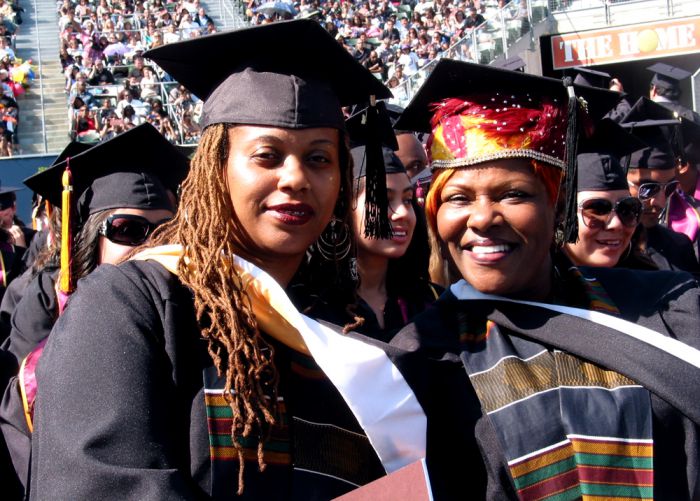While many members of the Class of 2011 at California State University, Dominguez Hills celebrated becoming the first in their families to earn a college degree, Tamanika Ferguson (Class of ’07, B.A., Africana studies/public administration) and Betty Knight (Class of ’08, B.A., performing arts) earned the distinction of becoming the first graduate students to complete a master’s degree in interdisciplinary studies with an emphasis in Africana studies. Each student was required to use two disciplines to develop a specialized interdisciplinary program; Ferguson included sociology in her emphasis, while Knight’s studies encompassed negotiation, conflict resolution, and peace building.

Dr. Rudy Vanterpool, acting chair of Africana studies, says that Ferguson and Knight are “trailblazers.”
“They’ve accomplished a significant milestone in their lives,” he says. “It took hard, dedicated work to get them there. But it’s a beginning; they don’t mean to stop… they want to further their education.
Ferguson, who looks forward to a career as an educator, says that the lack of a balanced education about their ancestry has left many African Americans with an identity crisis, an issue she addressed in her master’s thesis, “Race, Gender, and the Politics of Representation.”
“It’s not until you get to college, with its opportunities to study and learn about African history and cultural experiences, that we are introduced to enlightened ways of understanding of our true identities,” she says. “Many children are not taught about their African ancestors because their parents were not taught themselves or have been living in self-denial about their ancestors and heritage. They have no idea about the rich diversity of languages spoken. Their knowledge of Africa as a once economically thriving continent and a geographical region where great cultures thrived is very limited.”
Ferguson, who had the opportunity to visit Ghana in 2007, says that the experience was “a cultural and spiritual awakening,” and looks forward to studying there while working toward a doctorate.
“I have for a long time embraced the fact that Africa is my ancestral homeland and that my identity as an African American woman is linked to a past rooted in the African experience,” she says. “The classroom learning experience and all the reading I’ve done on the historical experiences of African people has been very educational, rewarding, and beneficial to me as an African American woman, Ferguson said. “But spending a month in Ghana was an experience I will never forget. Despite the fact that I was born here in the United States, I felt very much at home there.”
Knight says that she was introduced to the history of the Harlem Renaissance while completing her undergraduate degree.
“It was then that I discovered the richness of [African American] history. Their humanity was proven through the arts and their spirit of resilience was empowered by their fundamental self-worth,” says Knight, who for one assignment wrote an essay on the life and work of Zora Neale Hurston. “The impact of the artists of the Harlem Renaissance blazed trails for the generations that came after them. I imagined what it must have been like to be valued at last for one’s ideas.”
Knight says that the life of Frederick Douglass, whom she featured prominently in her master’s thesis titled, “More than a Speech, a Struggle – How the Constitution and Christianity Were Used as Liberation Tools for Change: A Critical Analysis of Three Selective Speeches of Frederick Douglass, Dr. Martin Luther King, Jr., and Senator Barack Obama,” has also inspired her to a career in the professorate.
“An education was not a choice provided for African Americans [in Douglass’s time]; in fact, it was an unlawful, unpardonable offense to teach slaves how to read,” notes Knight. “Yet our ancestors decided to learn, to read, and to write and showed future generations how to turn tragedy into strategy. My degrees give me options and opportunities. My education at Dominguez Hills has revealed to me in 2011 what was revealed to Frederick Douglass in 1846: that achieving an education makes every African American forever unfit to be or remain a slave in a global workplace and society.”
Knight says that she looks forward to influencing women of all ages through her motivational speaking and as a proud alumna of CSU Dominguez Hills.
“I want to take these profound academic experiences and impart hope into all whose lives I have the opportunity to influence,” she says. More specifically, I would like to influence women [and] instill in them the fortitude never to give up.”
Ferguson, who is applying to graduate school and looking forward to a teaching career at the university level, says that a college education has not only opened many doors for her, but ensures a brighter future for her college-age daughter who is completing her undergraduate degree at CSU Northridge.
“I was exposed early on to street life and everything that comes with it,” says Ferguson. “I am often told by those with whom I grew up that I am very fortunate because I made it out of that. For me, a college education has meant more than just a way out of a life of crime and selling drugs. A college education has meant having a voice, becoming a leader and participant in our society, and living life to the fullest. It has meant that I may pass down knowledge to my daughter and her generation. It has meant that I can contribute to social change and make our world a better place to live.”